2023届高三英语复习语法将来完成时 课件-(共21张PPT)
文档属性
| 名称 | 2023届高三英语复习语法将来完成时 课件-(共21张PPT) |  | |
| 格式 | zip | ||
| 文件大小 | 617.6KB | ||
| 资源类型 | 教案 | ||
| 版本资源 | 通用版 | ||
| 科目 | 英语 | ||
| 更新时间 | 2023-03-31 23:21:05 | ||
图片预览

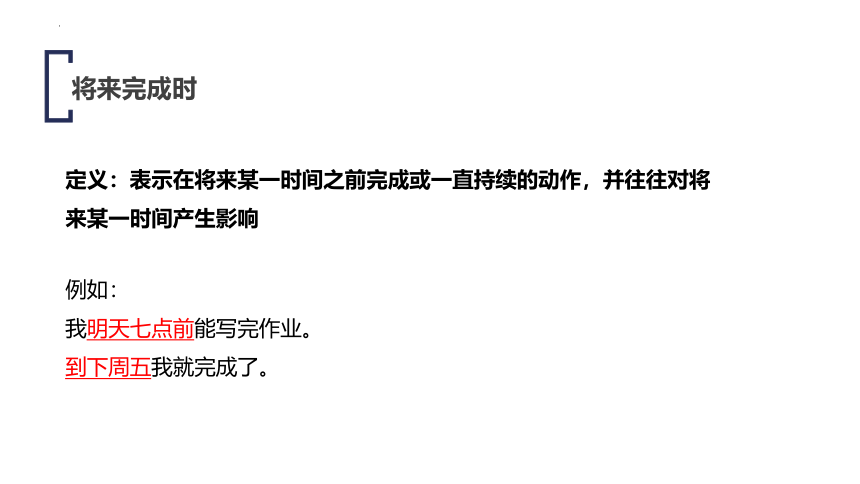
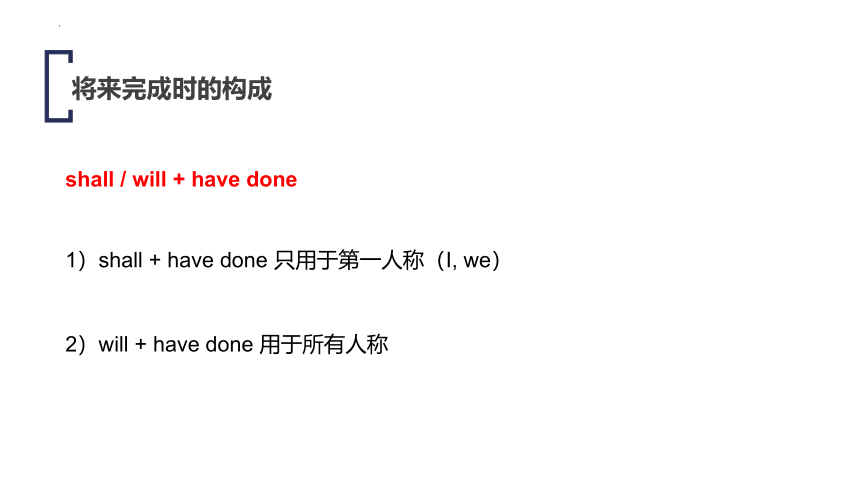
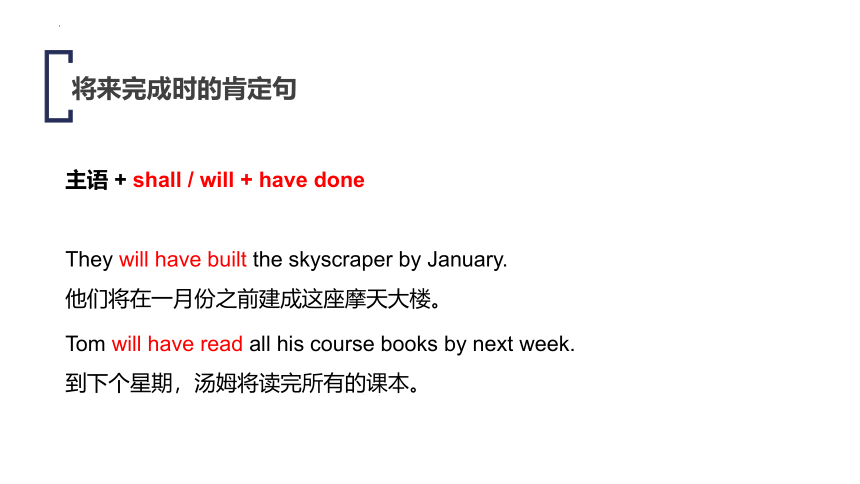
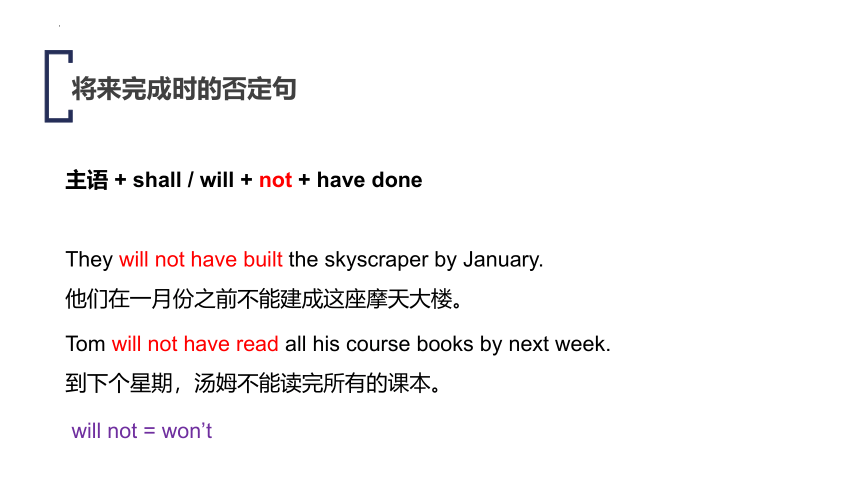



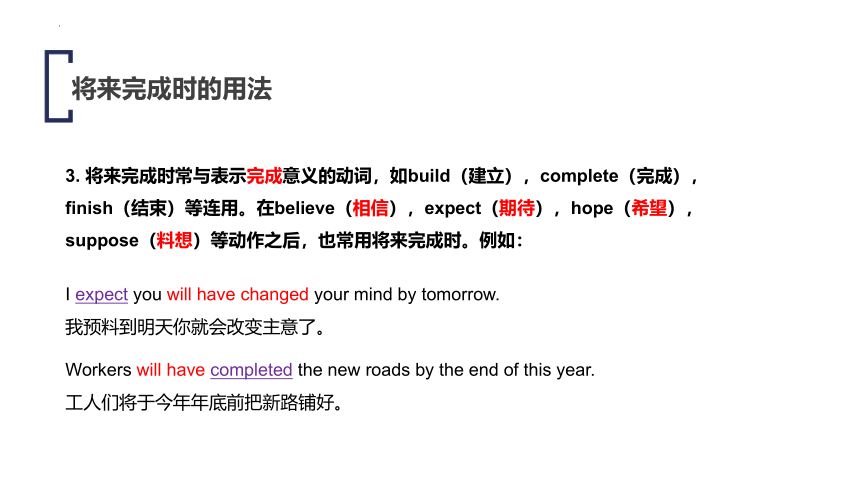
文档简介
(共21张PPT)
英语语法体系——
将来完成时(The future perfect)
将来完成时
定义:表示在将来某一时间之前完成或一直持续的动作,并往往对将来某一时间产生影响
例如:
我明天七点前能写完作业。
到下周五我就完成了。
将来完成时的构成
shall / will + have done
1)shall + have done 只用于第一人称(I, we)
2)will + have done 用于所有人称
将来完成时的肯定句
主语 + shall / will + have done
They will have built the skyscraper by January.
他们将在一月份之前建成这座摩天大楼。
Tom will have read all his course books by next week.
到下个星期,汤姆将读完所有的课本。
将来完成时的否定句
主语 + shall / will + not + have done
They will not have built the skyscraper by January.
他们在一月份之前不能建成这座摩天大楼。
Tom will not have read all his course books by next week.
到下个星期,汤姆不能读完所有的课本。
will not = won’t
将来完成时的一般疑问句
shall / will + 主语 + have done
Will they have built the skyscraper by January
他们在一月份之前能建成这座摩天大楼吗?
Will Tom have read all his course books by next week
到下个星期,汤姆能读完所有的课本吗?
将来完成时的用法
1. 表示在将来某一时间之前已经完成的动作,并往往对将来某一时间产生影响
经常与“before+将来时间”或“by+将来时间”连用,也可以与before或by the time (that) 引导的现在时的从句连用。例如:
I will have read all this books by the end of this term.
到这个学期末,我将读完所有的这些书。
By the time you get home, I will have cleaned the house from top to bottom.
你到家之前,我将把房子彻底打扫一遍。
将来完成时的用法
2. 表示将来某一阶段内持续发生的动作
He will have reorganized the company in about half a year.
他将用半年左右的时间重组这个公司。
We will have been married 25 years on June 26th.
到6月26日我们俩结婚就满25年了。
将来完成时的用法
3. 将来完成时常与表示完成意义的动词,如build(建立),complete(完成),finish(结束)等连用。在believe(相信),expect(期待),hope(希望),suppose(料想)等动作之后,也常用将来完成时。例如:
I expect you will have changed your mind by tomorrow.
我预料到明天你就会改变主意了。
Workers will have completed the new roads by the end of this year.
工人们将于今年年底前把新路铺好。
将来完成时的用法
4. 表示推测、设想,相当于“must have done”结构。翻译为“应该已经……”、“很有可能已经……”。例如:
You will have heard of this, I guess.
我想你已经听说过这件事了。
It’s five o’clock. They will have arrived home by now.
已经五点钟了,他们现在已经已经到家了。
将来完成时的用法
5. 在时间从句和条件从句中,现在完成时可以代替将来完成时,表示将来某个时间已经完成的动作。例如:
You’ll get to like the subject after you have studied it for some tome.
在学习这个学科一段时间之后,你就会喜欢它的。
I’ll go and see the exhibition as soon as I have finished my work.
我一做完作业就去看展览。
如果不强调动作的完成(且不会引起歧义),有时也可用一般现在时。例如:
I will go with you when I finish my work. 我完成工作后就同你去。
现在完成时、过去完成时与将来完成时的区别
现在完成时以现在时间为参照点,表示在“现在”以前完成的动作或持续到“现在”的状态;
He has finished writing his novel. 他已经写完了他的小说。
过去完成时以过去时间为参照点,表示在“过去”某一时间以前发生的动作或持续到“过去”某一时间的状态;
将来完成时以将来时间为参照点,表示在“将来”某一时间为止已经完成的动作或持续到“将来”某一时间的状态。
He had finished writing his novel by the end of last year. 去年年底他就写完了他的小说。
He will have finished writing his novel by the end of next year. 到明年年底他就写完他的小说了。
单项选择
1. I want to pay a visit to my parents; I _____ in the foreign country for five months by next Sunday.
A. have been staying B. will have stayed
C. have stayed D. will be staying
2. I’m finally going back to my motherland; I _____ in the foreign country for four years by next months.
A. have been staying B. will have stayed
C. have stayed D. will be staying
B
练一练
B
3. Hopefully in 2030 we will no longer be e-mailing each other, for we _____ communication tools by then.
A. have developed B. had developed
C. will have developed D. developed
4. By the time you get back from Canada, great changes _____ in this area.
A. will take place B. are to take place
C. would take place D. will have taken place
5. By next October, our efforts _____ of great benefit to the populations of birds on the islands.
A. will be B. have been C. are going to be D. will have been
C
D
D
6. George promise he _____ all the domestic chores by the time his parents are back this evening.
A. will finish B. has finished C. will be finishing D. will have finished
7. It is reported that by the end of this month the output of cars in this factory _____ by about 10%.
A. will be rising B. has been rising C. has risen D. will have risen
8. --- Can I call you back at two o’clock this afternoon
--- I’m sorry, but then _____ to Beijing. How about five
A. be flying B. will have flown C. will fly D. will be flown
D
D
B
9. By the time you have completed the essential training, you _____ exposed to virtually every new feature of the course.
A. will have been B. will be C. would have been D. would be
10. By the time the course ends, we _____ a lot about each other.
A. will learn B. have learned C. had learned D. will have learned
11. I am sorry that I can not meet you at the airport. I _____ Tianjin by the time you come back from abroad.
A. am leaving B. will leave C. will have left D. have left
12. By the end of this month, we surely _____ a satisfactory solution to the problem.
A. have found B. will be finding C. will have found D. are finding
C
D
C
C
13. By the time Jane gets homo, her aunt _____ for Lindon to attend a meeting.
A. will leave B. leaves C. will have left D. leave
14. --- May I speak to the manager at five o’clock this afternoon
--- Sorry, but he _____ to a conference by then.
A. has gone B. would have gone C. will have gone D. had gone
15. She ahs been studying here for five years and by the time of next summer she _____.
A. will graduate B. will be graduating C. will be graduated D. will have graduated
16. Shen she graduates from the college this summer, she _____ here for four years.
A. will study B. will have studied C. is to study D. has studied
C
C
D
B
17. It is reported that by the end of this year, the import of fruit and seafood _____ by about 10% because of the pandemic of coronavirus.
A. has decreased B. will have decreased
C. will be decreased D. has been decreasing
18. By the time you get this letter, I _____ the country.
A. will leave B. will have left C. would leave D. am leaving
19. By the time he comes back from London, I _____ the project.
A. finish B. have finished C. will finish D. will have finished
20. When you have finished the report, believe or not, I _____ for about 3 hours.
A. will be waiting B. waited C. will have waited D. have waited
B
B
D
C
用单词的适当形式完成句子
1. If the trend continues, by 2020, the world __________ (lose) two-thirds of its vertebrate biodiversity.
2. Is it likely that scientists _______________ (discover) a cure cancer by the year 2040
3. I hope Jack’s health _______________ (improve) greatly by the time we go back to school this September.
4. My train arrives in Shanghai at 10 this morning. The plane I would like to take from there __________ (leave) by then.
5. --- I hear that Jason is planning to buy a car.
--- I know. By next month, he ____________ (save) enough for a used one.
will have lost
练一练
will have discovered
will have improved
will have left
will have saved
6. You needn’t hurry her. She _____________ (finish) it by the time you are ready.
7. They read this letter to him on the air: “Hello, my name is Brenda Schemitz, when you receive this letter, I __________ (lose) my battle to cancer.”
8. We are late. I expected the film ______________ (start) by the time we get to the cinema.
9. By the time he leaves university, he __________ (get) work experience so long as he takes a part-time job.
10. --- Tommy is planning to buy a car.
--- I know. By next month, he ____________ (save) enough for a used one.
11. By the time you arrive in London, we ____________ (stay) in Europe for two weeks.
12. By the time he moves to Beijing next week, I _______________ (return) his books.
13. China _______________ (reduce) the carbon dioxide emissions a lot by 2030, the vice premier told the media.
14. We will _______________ (marry) for two years on Christmas.
will have finished
will have lost
will have started
will have got
will have saved
will have stayed
will have returned
will have reduced
have been married
英语语法体系——
被动语态
英语语法体系——
将来完成时(The future perfect)
将来完成时
定义:表示在将来某一时间之前完成或一直持续的动作,并往往对将来某一时间产生影响
例如:
我明天七点前能写完作业。
到下周五我就完成了。
将来完成时的构成
shall / will + have done
1)shall + have done 只用于第一人称(I, we)
2)will + have done 用于所有人称
将来完成时的肯定句
主语 + shall / will + have done
They will have built the skyscraper by January.
他们将在一月份之前建成这座摩天大楼。
Tom will have read all his course books by next week.
到下个星期,汤姆将读完所有的课本。
将来完成时的否定句
主语 + shall / will + not + have done
They will not have built the skyscraper by January.
他们在一月份之前不能建成这座摩天大楼。
Tom will not have read all his course books by next week.
到下个星期,汤姆不能读完所有的课本。
will not = won’t
将来完成时的一般疑问句
shall / will + 主语 + have done
Will they have built the skyscraper by January
他们在一月份之前能建成这座摩天大楼吗?
Will Tom have read all his course books by next week
到下个星期,汤姆能读完所有的课本吗?
将来完成时的用法
1. 表示在将来某一时间之前已经完成的动作,并往往对将来某一时间产生影响
经常与“before+将来时间”或“by+将来时间”连用,也可以与before或by the time (that) 引导的现在时的从句连用。例如:
I will have read all this books by the end of this term.
到这个学期末,我将读完所有的这些书。
By the time you get home, I will have cleaned the house from top to bottom.
你到家之前,我将把房子彻底打扫一遍。
将来完成时的用法
2. 表示将来某一阶段内持续发生的动作
He will have reorganized the company in about half a year.
他将用半年左右的时间重组这个公司。
We will have been married 25 years on June 26th.
到6月26日我们俩结婚就满25年了。
将来完成时的用法
3. 将来完成时常与表示完成意义的动词,如build(建立),complete(完成),finish(结束)等连用。在believe(相信),expect(期待),hope(希望),suppose(料想)等动作之后,也常用将来完成时。例如:
I expect you will have changed your mind by tomorrow.
我预料到明天你就会改变主意了。
Workers will have completed the new roads by the end of this year.
工人们将于今年年底前把新路铺好。
将来完成时的用法
4. 表示推测、设想,相当于“must have done”结构。翻译为“应该已经……”、“很有可能已经……”。例如:
You will have heard of this, I guess.
我想你已经听说过这件事了。
It’s five o’clock. They will have arrived home by now.
已经五点钟了,他们现在已经已经到家了。
将来完成时的用法
5. 在时间从句和条件从句中,现在完成时可以代替将来完成时,表示将来某个时间已经完成的动作。例如:
You’ll get to like the subject after you have studied it for some tome.
在学习这个学科一段时间之后,你就会喜欢它的。
I’ll go and see the exhibition as soon as I have finished my work.
我一做完作业就去看展览。
如果不强调动作的完成(且不会引起歧义),有时也可用一般现在时。例如:
I will go with you when I finish my work. 我完成工作后就同你去。
现在完成时、过去完成时与将来完成时的区别
现在完成时以现在时间为参照点,表示在“现在”以前完成的动作或持续到“现在”的状态;
He has finished writing his novel. 他已经写完了他的小说。
过去完成时以过去时间为参照点,表示在“过去”某一时间以前发生的动作或持续到“过去”某一时间的状态;
将来完成时以将来时间为参照点,表示在“将来”某一时间为止已经完成的动作或持续到“将来”某一时间的状态。
He had finished writing his novel by the end of last year. 去年年底他就写完了他的小说。
He will have finished writing his novel by the end of next year. 到明年年底他就写完他的小说了。
单项选择
1. I want to pay a visit to my parents; I _____ in the foreign country for five months by next Sunday.
A. have been staying B. will have stayed
C. have stayed D. will be staying
2. I’m finally going back to my motherland; I _____ in the foreign country for four years by next months.
A. have been staying B. will have stayed
C. have stayed D. will be staying
B
练一练
B
3. Hopefully in 2030 we will no longer be e-mailing each other, for we _____ communication tools by then.
A. have developed B. had developed
C. will have developed D. developed
4. By the time you get back from Canada, great changes _____ in this area.
A. will take place B. are to take place
C. would take place D. will have taken place
5. By next October, our efforts _____ of great benefit to the populations of birds on the islands.
A. will be B. have been C. are going to be D. will have been
C
D
D
6. George promise he _____ all the domestic chores by the time his parents are back this evening.
A. will finish B. has finished C. will be finishing D. will have finished
7. It is reported that by the end of this month the output of cars in this factory _____ by about 10%.
A. will be rising B. has been rising C. has risen D. will have risen
8. --- Can I call you back at two o’clock this afternoon
--- I’m sorry, but then _____ to Beijing. How about five
A. be flying B. will have flown C. will fly D. will be flown
D
D
B
9. By the time you have completed the essential training, you _____ exposed to virtually every new feature of the course.
A. will have been B. will be C. would have been D. would be
10. By the time the course ends, we _____ a lot about each other.
A. will learn B. have learned C. had learned D. will have learned
11. I am sorry that I can not meet you at the airport. I _____ Tianjin by the time you come back from abroad.
A. am leaving B. will leave C. will have left D. have left
12. By the end of this month, we surely _____ a satisfactory solution to the problem.
A. have found B. will be finding C. will have found D. are finding
C
D
C
C
13. By the time Jane gets homo, her aunt _____ for Lindon to attend a meeting.
A. will leave B. leaves C. will have left D. leave
14. --- May I speak to the manager at five o’clock this afternoon
--- Sorry, but he _____ to a conference by then.
A. has gone B. would have gone C. will have gone D. had gone
15. She ahs been studying here for five years and by the time of next summer she _____.
A. will graduate B. will be graduating C. will be graduated D. will have graduated
16. Shen she graduates from the college this summer, she _____ here for four years.
A. will study B. will have studied C. is to study D. has studied
C
C
D
B
17. It is reported that by the end of this year, the import of fruit and seafood _____ by about 10% because of the pandemic of coronavirus.
A. has decreased B. will have decreased
C. will be decreased D. has been decreasing
18. By the time you get this letter, I _____ the country.
A. will leave B. will have left C. would leave D. am leaving
19. By the time he comes back from London, I _____ the project.
A. finish B. have finished C. will finish D. will have finished
20. When you have finished the report, believe or not, I _____ for about 3 hours.
A. will be waiting B. waited C. will have waited D. have waited
B
B
D
C
用单词的适当形式完成句子
1. If the trend continues, by 2020, the world __________ (lose) two-thirds of its vertebrate biodiversity.
2. Is it likely that scientists _______________ (discover) a cure cancer by the year 2040
3. I hope Jack’s health _______________ (improve) greatly by the time we go back to school this September.
4. My train arrives in Shanghai at 10 this morning. The plane I would like to take from there __________ (leave) by then.
5. --- I hear that Jason is planning to buy a car.
--- I know. By next month, he ____________ (save) enough for a used one.
will have lost
练一练
will have discovered
will have improved
will have left
will have saved
6. You needn’t hurry her. She _____________ (finish) it by the time you are ready.
7. They read this letter to him on the air: “Hello, my name is Brenda Schemitz, when you receive this letter, I __________ (lose) my battle to cancer.”
8. We are late. I expected the film ______________ (start) by the time we get to the cinema.
9. By the time he leaves university, he __________ (get) work experience so long as he takes a part-time job.
10. --- Tommy is planning to buy a car.
--- I know. By next month, he ____________ (save) enough for a used one.
11. By the time you arrive in London, we ____________ (stay) in Europe for two weeks.
12. By the time he moves to Beijing next week, I _______________ (return) his books.
13. China _______________ (reduce) the carbon dioxide emissions a lot by 2030, the vice premier told the media.
14. We will _______________ (marry) for two years on Christmas.
will have finished
will have lost
will have started
will have got
will have saved
will have stayed
will have returned
will have reduced
have been married
英语语法体系——
被动语态
